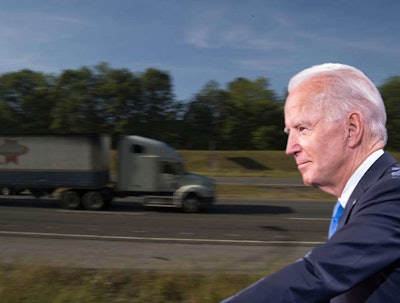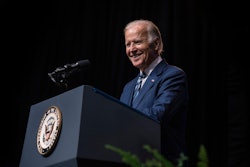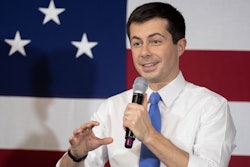What a Biden presidency ultimately will mean for the trucking industry and motor carriers is obviously a large question mark. But reading the tea leaves — examining the clues at hand so far — it seems a safe bet to expect a ramp-up in regulatory activity in the next four years, with a resumed focus by the federal government on reducing emissions output.
(Note: Since this story was filed, Biden tapped former mayor and presidential contender Pete Buttigieg to head the Department of Transportation.)
President-elect Biden so far has made clear his intent on climate policy. One of his first major announcements regarding personnel after being declared the winner of the 2020 presidential race Nov. 7 was naming John Kerry, former Senator and Secretary of State, his so-called “special envoy on climate.” And just this week, he named Gina McCarthy, the Obama-era head of the Environmental Protection Agency, as the incoming administration’s “climate czar.”
According to reports from The Washington Post and NPR, the pair will work in tandem to make climate policy a focus across all federal departments, including the U.S. DOT, obviously, and its sub-agencies like the Federal Motor Carrier Safety Administration. Kerry, more broadly, will be working internationally on coordinating climate policies, while McCarthy will focus more on domestic issues. What their roles mean in terms of rubber-on-the-road policy is unclear, though WaPo reports the moves are intended to “maximize executive authority” to address climate policy in the absence of Congressional action.
 Digging more specifically into trucking regulations, Biden’s presidency likely will more closely mirror President Obama’s than President Trump’s. There was a documented slowdown in regulatory filings under Trump, due in large part to Executive Orders issued in the first days of his presidency. Biden says he intends to issue orders rescinding those regulatory blockades.
Digging more specifically into trucking regulations, Biden’s presidency likely will more closely mirror President Obama’s than President Trump’s. There was a documented slowdown in regulatory filings under Trump, due in large part to Executive Orders issued in the first days of his presidency. Biden says he intends to issue orders rescinding those regulatory blockades.Likewise, on climate, one of the early names floated as a potential head of the Environmental Protection Agency under Biden was Mary Nichols, the long-time head of California’s Air Resources Board (CARB). She’s largely credited with shepherding into effect the nation’s most strict emissions laws, including those for Class 8 trucks and trailers, in her roughly 40-year tenure as CARB’s chief. This week, it was reported Nichols is no longer in the running for the job, with some arguing she’s too stiff on emissions policies and others arguing she’s not stiff enough.
Lastly, Biden says he intends to quickly rejoin the Paris Climate Agreement after assuming the presidency. President Obama signed the U.S. into participation of the mid-2016 signed agreement, but Trump announced in June 2017 that he was abandoning the global climate pact. The U.S. officially withdrew last year, with Trump arguing it doesn’t do enough to hold accountable heavy polluters like China and India, and that the pact is unfair to the U.S. and U.S. businesses.
My colleague Tom Quimby, associate editor of CCJ, explored Biden’s climate policy more in-depth in November, examining what it means for alt fuels, fuel cells and battery-powered vehicles. Read that story here.
Digging more specifically into trucking regulations, Biden’s presidency likely will more closely mirror President Obama’s than President Trump’s. There was a documented slowdown in regulatory filings under Trump, due in large part to Executive Orders (EO) issued in the first days of his presidency. Those included orders like the regulatory freeze and the “two-for-one” EO, which required agencies like DOT and FMCSA to nix two regulations for every new one enacted. It was obviously meant to stymie new regulatory activity. Likewise, Trump required agencies to establish regulatory review panels to target regs deemed outdated or unnecessary for possible removal.
The DOT panel didn’t result in sweeping of many, if any, trucking regulations. But the other orders did result in FMCSA tabling or outright nixing two regulations in the pipeline in Obama’s final year: A speed limiter mandate for heavy trucks that could have capped speeds at 65 mph for all tractor-trailers, and a rule to institute official sleep apnea screening and treatment processes for CDL holders.
Also, since winning a majority in the U.S. House in 2018, Democrats have, in various highway and appropriations bills, laid out a bolstered regulatory agenda in regards to trucking, including calling on a return to public view of CSA scores, resumption of speed limiter and sleep apnea rules, and even blocking the newly minted hours of service reforms (that bill was floated prior to the rule taking effect in September), among other initiatives. With Biden in the White House, and the Senate majority still undecided, those types of statutes definitely have more teeth.
Biden hasn’t spoken on that granular of a level about what regulations might resume or be taken up under his administration, but he has said he intends to issue a slate of new EOs to strike the two-for-one order and others that capped regulatory activity by federal agencies.
New regulatory filings in the Federal Register under Trump were decidedly fewer and farther between – not just for FMCSA, but across all executive agencies. For example, according to data compiled by Ballotopedia as part of its Administrative State Project, Trump’s first three years in office ranked as the three lowest total page numbers in the Federal Register since 2001 — that’s after the Federal Register hit an all-time high page count in 2016, Obama’s last year in office. The Register is the official public record of regulatory activity by federal agencies.
According to CCJ‘s most recent MarketPulse survey, a monthly anonymous survey conducted of motor carrier executives across various sizes and applications, showed respondents also expect a ramp-up in regulatory actions and policies that potentially could slow economic activity.
In the first survey conducted since the election, the political climate in Washington jumped to the No. 2 concern among fleet executives, surpassing both freight pricing and freight volume. Of those surveyed, 23% ranked it as their No. 1 concern, while another 12% ranked it as their No. 2 concern.
Below is a roundup of comments pulled from that survey. (Quick note, too, for the sake of transparency: There were no positive comments filed about expectations for a Biden presidency in this MarketPulse report. Otherwise, they would have been included.)
“Assuming Biden becomes the POTUS, I expect the Trump economy to carry us for a while longer, then I expect Biden to start regulating businesses more by reversing Trump’s deregulation, raising taxes and sending manufacturing back overseas. I expect a slower GDP, pessimistic business outlooks and basically a return to the excruciating sluggish economic growth and manufacturing that we had with eight years of Obama,” said one fleet executive.
“If Biden implements his taxing plan and his desire to cease fracking, we could be in for a long four years,” said another.
“Things are somewhat stable. Will they remain under a Democrat? Higher insurance minimums to give trial lawyers a raise. Biden could kill our economy,” said another survey respondent.











